(Reuters) – An international treaty expected to be signed next week is an important step to protect the intellectual property rights of actors and the creative industries but hard work will be needed to enforce it, an official involved with the pact said.

Hollywood stars including Meryl Streep and Javier Bardem have backed efforts to push the treaty, which has been more than a decade in the making. Digital technology has made it easy to download movies or television shows without paying for them.
Actors’ rights to remuneration and protection of their work – unlike those of directors, screenwriters and musicians – are not included in current international copyright law.
Actors whose shows or films are sold abroad currently have no legal right to payment for those broadcasts, and if payment is made, it generally goes to the producer.
They also have no rights in many countries if their work is manipulated in any way that may harm their reputation.
“It’s a real problem – it’s not an artificial problem,” Francis Gurry, the World Intellectual Property Organization’s director general, told Reuters in an interview on Wednesday.
“The actors are the ones, in the international framework, who have not been catered for.”
An agreement between the United States and European Union last year paved the way for concluding the pact, though the ratification process by the U.N. body’s 185 member states will take longer.
Once the treaty is signed in Beijing next week it will be up to individual countries to enforce its provisions, Gurry said, acknowledging that that could be hard in many places.
“These are necessary steps in the right direction. We have to follow through on the ground to make sure that it isn’t just a symbolic act, to make sure it’s got some reality to it,” he said.
“I know it’s frustrating – why can’t it happen overnight? The reality is that it requires a complete social adjustment.”
China and Russia, for example, are regularly excoriated by the United States and European Union for their widespread copyright piracy, despite often having laws in place to fight the problem.
In China, the latest Hollywood movies are generally widely available for sale on pirated DVDs for about $1 each soon after U.S. theatre releases – sometimes even before – costing the industry hundreds of millions of dollars a year.
“When you take a country that’s coming from basically an agricultural economy to an advanced economy, at least in some parts, in a process of 30 years, it’s normal I think that it takes time for them to develop a widespread awareness that … there’s more value in what’s on the disc than the physical disc itself,” Gurry said.
(Reporting by Ben Blanchard; Editing by Robert Birsel)





